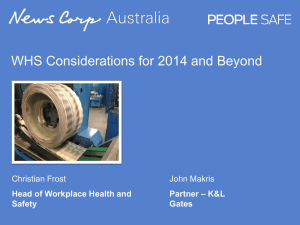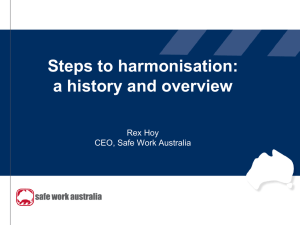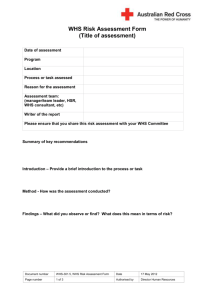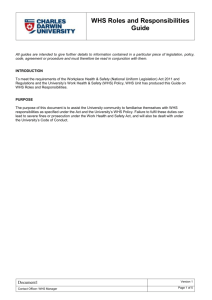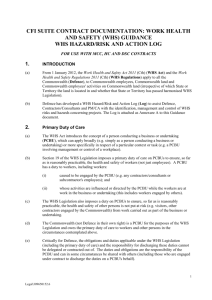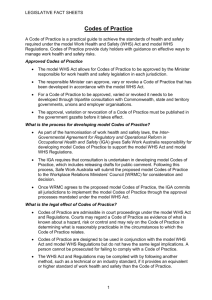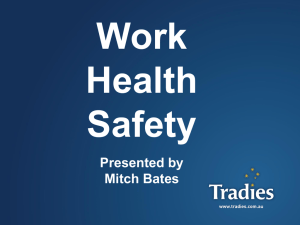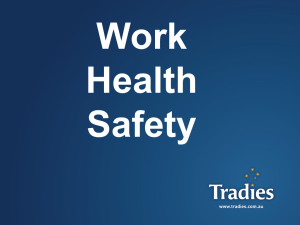WHS Responsibilities - Mining & Quarrying Occupational Health
advertisement
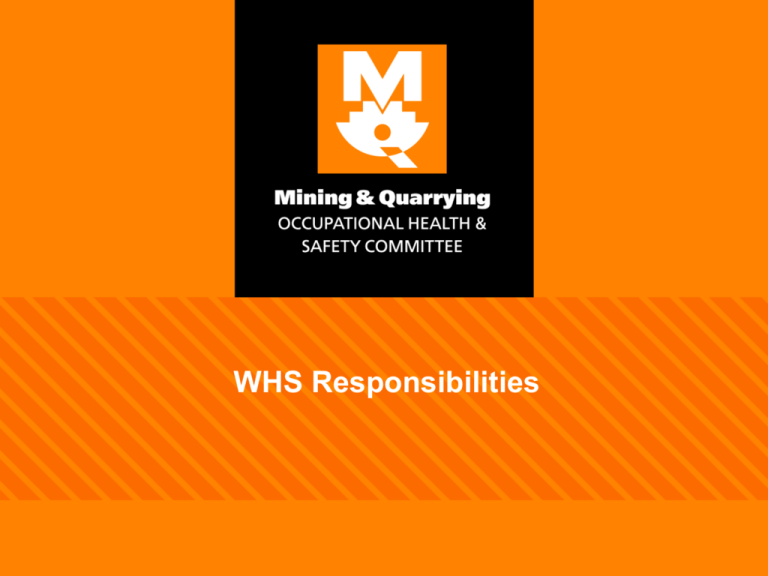
WHS Responsibilities Disclaimer 2 IMPORTANT: The information in this presentation is of a general nature, and should not be relied upon as individual professional advice. If necessary, legal advice should be obtained from a legal practitioner with expertise in the field of WHS law. Although every effort has been made to ensure that the information in this presentation is complete, current and accurate, the Mining & Quarrying Occupational Health & Safety Committee, any agent, author, contributor or the South Australian Govt, does not guarantee that it is so, and the Committee accepts no responsibility for any loss, damage or personal injury that may result from the use of any material which is not complete, current and accurate. Users should always verify historical material by making and relying upon their own separate inquiries prior to making any important decisions or taking any action on the basis of this information. Session Overview 3 Work Health & Safety Legal Framework PCBU Primary Duty of Care Management of Risks Officer Duty Worker’s Duty of Care Penalties Health and Safety Representative’s Role Managers’, Supervisors’ and Team Leaders’ Duties Defined Roles and Responsibilities Mine Holder / Mine Operator Duty Safety Management Systems for Mines Liability Summary WHS Legal Framework WHS Act SA 2012 WHS Regulations SA 2012 Codes of Practice 4 Work Health and Safety Act 2012 The South Australian Work Health and Safety Act 2012 provides a framework to protect the health, safety and welfare of all workers at work and of other people who might be affected by the work. The WHS Act aims to: 5 protect the health and safety of workers and other people by eliminating or minimising risks promote information, education and training on WHS and provide effective compliance and enforcement measures deliver continuous improvement and higher standards of WHS ensure fair and effective representation, consultation and cooperation to address and resolve WHS issues encourage unions and employer organisations to take a constructive role in improving WHS practices, and assisting businesses and workers to achieve a healthier and safer working environment. Work Health and Safety Regulations The South Australian Work Health and Safety Regulations 2012, state the way in which some duties under the WHS Act must be met and prescribes procedural or administrative requirements to support the WHS Act. This includes but is not limited to the following: Authorisations Registration and licencing for asbestos removal and high risk work Workplace Facilities, first aid and personal protective equipment Chemicals Lead, asbestos, labelling, safety data sheets and major hazard facilities Other hazards Plant, manual tasks, noise, work at heights, remote and isolated work, confined spaces, electricity Mining Operations Safety management systems, principle mining hazards and emergency response plans, management of contractors 6 Approved Codes of Practice Provide practical guidance on how to meet the standards set out in the Act and Regulations. Codes of Practice: are a tool to help PCBUs to meet compliance are admissible in court proceedings as evidence of whether or not a duty has been complied with can also be referred to by an inspector when issuing an improvement or prohibition notice. Compliance with Codes of Practice is not mandatory providing that any other method used provides an equivalent or higher standard of WHS than suggested by the Code of Practice. 7 Reasonably Practicable Under the WHS Act 2012 (SA), S.18 – What is “reasonably practicable” in ensuring health and safety? Reasonably practicable in relation to a duty to ensure health and safety, means: 8 that which is, or was at a particular time, reasonably able to be done to ensure health and safety, taking into account and weighing up all relevant matters. Reasonably Practicable Under the WHS Act 2012 (SA), S.18 – What is “reasonably practicable” in ensuring health and safety? This also includes: 9 the likelihood of the hazard or the risk concerned occurring and the degree of harm that might result from the hazard or the risk what the person knows, or should reasonably know, about the hazard or the risk, and the ways of eliminating or minimising the risk the availability and suitability of those ways of eliminating or minimising the risk after assessing the risk, identifying ways of eliminating or minimising the risk and the costs, including whether the cost is grossly disproportionate to the risk. Person Conducting Business or Undertaking Under the WHS Act 2012 (SA), S.5 - Meaning of person conducting a business or undertaking (employer) The definition of a person conducting a business or undertaking (PCBU) means a person conducts a business or undertaking: whether the person conducts the business or undertaking alone or with others whether or not the business or undertaking is conducted for profit or gain. This includes a business or undertaking conducted by a partnership or an unincorporated association. 10 PCBU Primary Duty of Care Under the WHS Act 2012 (SA), S.19 - Primary Duty of Care A person conducting a business or undertaking (PCBU) must ensure, so far as is reasonably practicable, the health and safety of: 11 workers engaged, or caused to be engaged workers whose activities in carrying out work are influenced or directed while the workers are at work other persons (visitors and volunteers) are not put at risk from work carried out as part of the business activities. PCBU Primary Duty of Care Under the WHS Act 2012 (SA), S.19 - Primary Duty of Care A PCBU must ensure, so far as is reasonably practicable, the provision and maintenance of: 12 a work environment without risks to health and safety safe plant, structures and safe systems of work the safe use, handling and storage of plant, structures and substances adequate facilities to support the welfare of workers monitoring of the health of workers and conditions at the workplace to prevent illness or injury of workers any information, training, instruction or supervision that is necessary to protect all persons from risks to their health and safety. Officers Under the WHS Act 2012 (SA), S.27 – Officers The definition of an “officer” means: a director or secretary of the corporation a person who makes or participates in making decisions that affect the whole or a substantial part of the business of the corporation a person who has the capacity to affect significantly the corporation’s financial standing. The term “Officer” comes from Section 9 of the Commonwealth Corporations Act 2001. 13 Officers Duty Under the WHS Act 2012 (SA), S.27 – Officers Officers must take all reasonable steps to ensure the PCBU uses and applies: appropriate resources policies and procedures health and safety practices in the workplace. If a person is responsible only for implementing those decisions, they are not considered an officer. 14 PCBU Duty to Manage Risks Under the WHS Regulations 2012 (SA), R.34 - Duty to identify hazards A PCBU duty holder, in managing risks to health and safety, must: identify reasonably foreseeable hazards that could give rise to risks to health and safety. R.35 - Managing risks to health and safety A PCBU duty holder, in managing risks to health and safety, must: 15 eliminate risks to health and safety so far as is reasonably practicable; and if it is not reasonably practicable to eliminate risks to health and safety, minimise those risks so far as is reasonably practicable. PCBU Duty to Manage Risks Under the WHS Regulations 2012 (SA), R.36 - Hierarchy of control measures If it is not reasonably practicable for a duty holder to eliminate risks to health and safety, a duty holder must implement risk control measures by doing one or more of the following: substituting (wholly or partly) the hazard giving rise to the risk with something that gives rise to a lesser risk isolating the hazard from any person exposed to it implementing engineering controls If a risk then remains, the duty holder must minimise the remaining risk, so far as is reasonably practicable, by implementing administrative controls and, if a risk then remains, by ensuring the provision and use of suitable personal protective equipment. 16 Workers Under the WHS Act 2012 (SA), S.8 & 28 – Workers The definition of a “worker”: means a person who carries out work in any capacity for a PCBU The definition of a Worker has been expanded to include contractors and others whose work environment a PCBU has the capacity to control – this includes an employee of a labour hire company, an apprentice or trainee, work experience student or volunteer. Managers, supervisors and team leaders are also deemed to be workers! 17 Workers Duty of Care Under the WHS Act 2012 (SA), S.28 – Workers Workers have a duty and obligation to: 18 take reasonable care that his or her acts or omissions (actions or words) do not adversely affect the health and safety of other persons. comply, so far as the worker is reasonably able, with any reasonable instruction designed to protect their health and safety and that of any other persons while at work co-operate with any reasonable policy or procedure relating to health or safety at the workplace that they have been notified of. Penalties Category 1 – for reckless conduct that exposes an individual to a risk of death or serious injury or illness that is engaged in without reasonable excuse Category 2 – failure to comply with a health and safety duty that exposes an individual to a risk of death or serious injury or illness Category 3 – failure to comply with a health and safety duty Duty Holder Category 1 Category 2 Category 3 Individual worker or other person at the workplace $300,000 or 5 years imprisonment $150,000 $50,000 Individual PCBUs or officers $600,000 or 5 years imprisonment $300,000 $100,000 $3,000,000 $1,500,000 $500,000 Body Corporate or Government body 19 Health and Safety Representatives (HSR) Under the WHS Act 2012 (SA), 20 A work group must be established by a PCBU when a worker(s) requests that an HSR be elected. A work group(s) must be formed after consultation between the PCBU and the worker(s). The PCBU must provide any resources, facilities and assistance that are reasonably necessary or that are approved by legislation to enable elections to be conducted. Health and Safety Representatives (HSR) Under the WHS Act 2012 (SA), S.66 – Immunity of Health and Safety Representatives A health and safety representative is not personally liable for anything done or said to be done in good faith: 21 in exercising a power or performing a function under the Act; or in the reasonable belief that the thing was done or said to be done in the exercise of a power or the performance of a function under the Act. Health and Safety Representatives (HSR) Under the WHS Act 2012 (SA), S.68 – Powers and Functions of Health and Safety Representatives The powers and functions of a health and safety representative for a work group are: 22 to represent the workers in the work group in matters relating to work health and safety to monitor the measures taken by the PCBU, or that person's representative, in compliance with the Act in relation to workers in the work group investigate complaints from members of the work group relating to work health and safety to inquire into anything that appears to be a risk to the health or safety of workers in the work group. Health and Safety Representatives (HSR) Under the WHS Act 2012 (SA), S.68 – Powers and Functions of Health and Safety Representatives In exercising a power or performing a function, the HSR may: 23 inspect the workplace or any part of the workplace at which a worker in the work group works at any time, after giving reasonable notice to the PCBU at that workplace, or without notice in the event of an incident or any situation involving a serious risk to the health or safety of a person where there is an immediate or imminent exposure to a hazard accompany an inspector during an inspection of the workplace with the consent of a worker(s) that the HSR represents, be present at an interview concerning work health and safety between the worker or a group of workers and an inspector, PCBU and the person's representative request work to cease that places imminent and serious risks to workers health and safety. Managers, Supervisors and Team Leader Duties Managers, supervisors and team leaders often share the same responsibilities for WHS. The WHS Act states that each duty holder must comply with that duty to the standard required by this Act even if another duty holder has the same duty. If more than one person has a duty for the same matter, each person: 24 retains responsibility for the person’s duty; and must discharge their duty to the extent to which the person has the capacity to influence and control the matter or would have had that capacity but for an agreement or arrangement purporting to limit or remove that capacity. . Defined Roles and Responsibilities Having clearly defined roles and responsibilities means everyone knows what is expected and how they can contribute. PCBU, management, supervisors and workers (including contractors) should be able to locate their WHS roles and responsibilities in the following documents: Employment agreements Job descriptions Works contracts Inductions Workplace policies, procedures and work instructions Safe Work Method Statements Performance management criteria 25 Mine Holder / Mine Operator WHS Regulations 2012 (SA), chapter 10 – Mines The mine holder is the: mine operator unless they appoint another PCBU to be the mine operator PCBU with control over a right or entitlement to carry out mining operations at the mine (primary duty holder). A reference to a PCBU at a mine refers to the mine operator or mine holder of the mine and therefore the mine operator or mine holder will also have duties under the following sections of the WHS Act: 26 S.19 Primary duty of care S.20 Duty of PCBUs involving management or control of workplaces S.21 Duty of PCBUs involving management or control of fixtures, fittings or plant at workplaces Safety Management Systems for Mines WHS Regulations 2012 (SA), chapter 10 – Mines R.621 – Duty to Establish and Implement Safety Management System (SMS) Used as primary means of ensuring health & safety or workers & others Documented, readily available & understandable Part of overall management system Contents as specified in 622 Appropriate to nature & complexity of the mine Maintained to ensure effectiveness Reviewed at least every 3 years & sooner to remain effective Comprehensive & integrated Mine operator must establish & implement an SMS 27 Safety Management System R.621 Sufficient to refer to a plan/ document if already addressed Safety Management Systems for Mines Under the WHS Regulations 2012 (SA), R.622 – Content of Safety Management System Ventilation Control Plan & Ventilation Plan Principal Mining Hazard Management Plans Mine Survey Plan Withdrawal situations Emergency Plan Notifications Worker & Contractor Management Risk Management Health & Safety Policy 28 Specific Control Measures Safety Management System R.622 Performance Standards & Audit Safety Management Systems for Mines A safety management system (SMS) for a mine is the primary means of ensuring the safe operation of a mine. It brings together a number of procedures and policies to ensure it is comprehensive enough to suit the risks and complexity of the mine operations. It is a tool that enables a mine operator to follow a process that will assist them in systematically achieving and maintaining the required level of health and safety. A SMS also allows the mine operator to demonstrate the management of health and safety on site: 29 to other persons, in particular, contractors or other persons conducting a business or undertaking working at the mine site when seeking certification with an external organisation, and when assessing the mine systems against recognised industry standards. Liability Question: What are the limits of your liability? Answer: Your liability extends to the following: 30 Your qualifications (what you should know or ought to know) Training Level of experience Knowledge of the workplace and processes The specific WHS responsibilities and authorities as described in a position descriptions and workplace policies and procedures Summary PCBUs Have primary duty of care to all workers on site by providing a working environment without risks to health and safety Officers Ensure the PCBU uses and applies appropriate resources, policies, procedures and health and safety practices in the workplace Managers Are responsible and accountable for the implementation and performance of the business and management systems within their areas of responsibility Supervisors and team leaders Are responsible for the day to day operations to ensure workers are adequately supervised & working safely Workers Follow any reasonable instruction and do not place themselves or any one else at risk of injury through their acts or omissions (actions or words) 31 Further Information For further assistance, MAQOHSC WHS Specialists are available for guidance, onsite support and advice on WHS Matters. www.maqohsc.sa.gov.au MAQOHSC WHS Specialists can be contacted via: Les Allen Phone: 08 8204 9807 Mobile: 0403 160 706 Email: les.allen@sa.gov.au Eric McInerney Phone: 08 8303 9908 Mobile: 0448 914 630 Email: eric.mcinerney@sa.gov.au Work, Health and Safety Legislation, Codes of Practice, fact sheets, HSR information and guides can be found at the following websites: SafeWork SA - www.safework.sa.gov.au SafeWork Australia – www.safeworkaustralia.gov.au 32
